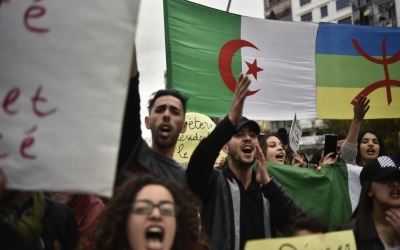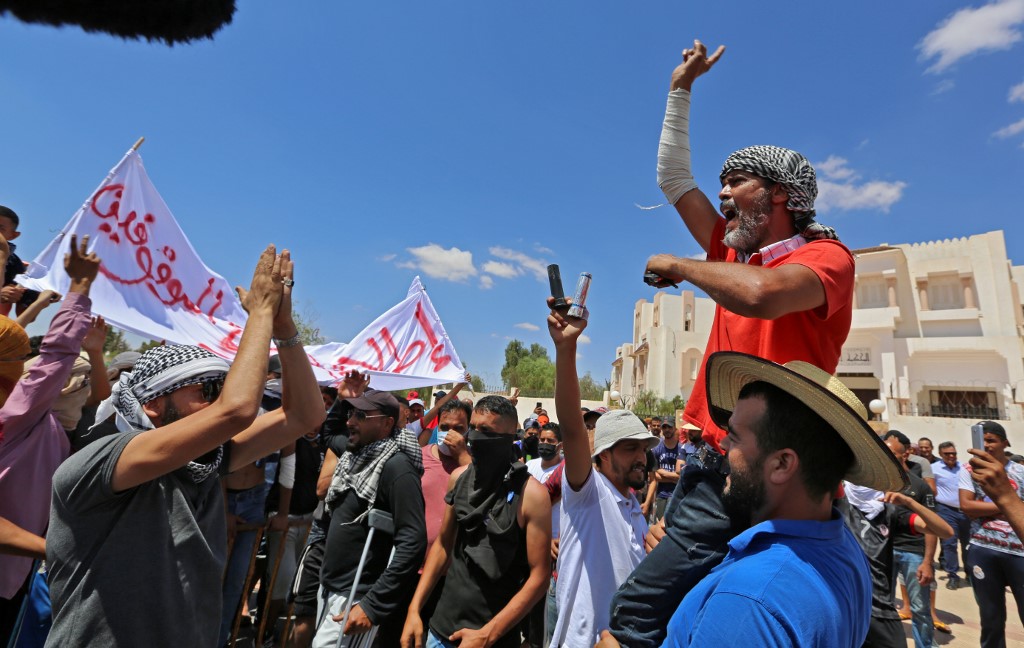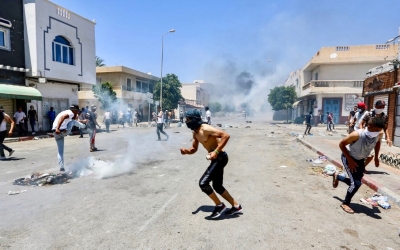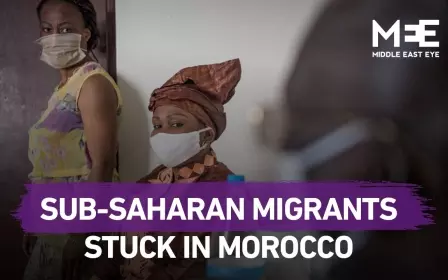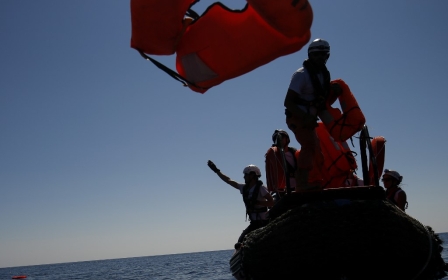Perilous crossings from North Africa to Europe swell as economic gloom sets in

For years, residents of the Maghreb have seen hopeful people from across Africa attempt to make the perilous crossing to Europe from their shores. Now, many of them are making the same journey.
This year has brought coronavirus lockdowns and dwindling economic prospects to Tunisia, Algeria and Morocco. With opportunities fast fading, its youth have begun to look north and across the Mediterranean.
According to the United Nations, attempts to reach the Italian coast from Tunisia alone jumped by 150 percent in the first four months of 2020, compared with the same period last year.
North Africa is one of the main global migratory routes. Both North and sub-Saharan Africans have used the coastline to attempt to reach Europe, often with devastating results.
Over 18,000 people have drowned or disappeared in the Mediterranean Sea while trying to reach Europe since 2014, according to the UN’s International Organisation for Migration.
Between 2016 and 2017, Libya was the main point of transit towards Europe, accounting for more than 90 percent of arrivals in Italy. However, due to EU and Italian efforts in the country since 2017, the number of those making the sea crossings from Libya have decreased. As a result, migration flows have been diverted to the southern and maritime borders of other Maghreb states.
Taking over from Italy, Spain became the main point of arrival in 2018, with an increase of departures to the country from Tunisia, Algeria, and Morocco, where in 2019 authorities stopped 30,000 people from illegally crossing and busted 60 migrant trafficking networks.
While a significant number of sub-Saharan migrants make the transitory route through Morocco and Algeria, the majority of those departing Tunisia are Tunisians themselves.
In early June, over 50 mainly sub-Saharan African migrants, a third of whom were women and children, drowned near the Kerkennah Islands in one of Tunisia’s worst drowning incidents since last year.
Algerians on the move
Similarly, authorities have arrested 1,433 people that were trying to depart illegally from Algeria’s shores in the first five months of 2020 - more than three times the number compared with 2019 - according to recent figures released by the defence ministry.
With the coronavirus outbreak hitting Algeria in March, growing numbers of Algerians are still attempting entry into Europe. Despite the monthly numbers of detentions dropping dramatically from 828 in January to 16 in March, Algerians risk breaking a 2009 law that imposes a six-month prison sentence for migrants intercepted at sea.
The popular protest movement that started in February last year was successful in toppling longtime president Abdelaziz Bouteflika, the only leader large swathes of the population had known in their lifetime. The historical moment was a boost of hope for the country’s youth.
But amid an ongoing crackdown against the protest movement and freedom of expression overseen by current President Abdelmadjid Tebboune - whose legitimacy is still questioned by Algerians - a crashing economy and depleting foreign currency coffers, people’s frustrations are pushing them to risk potential death in the pursuit of a better life.
'This trend confirms once again that the migrants reaching European shores are not coming from the poorest countries in Africa'
- Camille Le Coz, policy analyst
“Since the beginning of the year, a combination of factors has influenced the increase in arrivals from North Africa [such as] the economic slowdown triggered by the pandemic in the region but also national crises with the deterioration of the situation in [neighbouring] Libya and long-lasting political tensions in Algeria,” Camille Le Coz, a policy analyst at the Migration Policy Institute Europe, told Middle East Eye.
Despite curfews still in place and border closures preventing citizens from flying to or returning from Europe in some parts of North Africa, the ever-present severity in the lack of economic opportunities for the region’s youth has made people more determined to find better prospects in Europe - regardless of the high cases of Covid-19 and anti-immigrant sentiments in many European countries.
“[Tunisia and Algeria] were struggling economically even before Covid, and new governments in both have promised extensive economic reforms but have had little chance to actually begin to enact these,” Chloe Teevan, a political analyst focused on political and economic developments in North Africa, told MEE.
“Covid-19 has thus majorly affected young people’s employment and livelihoods as the informal sector was virtually shut down, and all those young people who had worked in the sector were forced to stay home through the long weeks of confinement.”
Tunisia unrest
In Tunisia, ongoing protests in the turbulent south, particularly in Tataouine, demanding the government invest millions in the region’s development and provide jobs to the unemployed have remained unaddressed despite taking place amid the same economic factors that ignited the Arab Spring in 2011.
While Tunisia is largely viewed as a success story compared to its counterparts who also experienced change brought on by mass demonstrations during the Arab Spring, the prevalence of corruption in the country, polarising politics, security threats from neighbouring Libya and the pandemic’s damaging effects on its key tourism sector have made the situation difficult for Tunisians.
The situation is even worse for the country’s estimated 75,000 migrants, whose poor living conditions make them particularly susceptible to the coronavirus.
“As of June 2020, a third of all African migrants arriving in Europe via Italy and Spain came from Morocco, Tunisia and Algeria,” Le Coz said.
“This trend confirms once again that the migrants reaching European shores are not coming from the poorest countries in Africa.”
EU-North Africa partnership
The migration crisis of the mid-2010s has been cemented as the dominant issue in EU-North Africa cooperation.
Since 2011, the EU has been intent on establishing a structured dialogue on migration, mobility, and security with the aim of helping partner countries in the south to strengthen their management capacity.
In the last couple of years, EU governments have prioritised border control and outsourcing of responsibility for migrants and asylum seekers to other countries. The move, however, has allowed little progress in ensuring safe and legal channels for migrants to enter the EU, or preventing them from being locked up in detention centres in deplorable conditions.
Whilst cooperation between Maghreb states and the EU has been largely positive, there is still room for improvement in some of the EU’s propositions.
In 2018, Algeria, Morocco, and Tunisia rejected EU plans for "regional disembarkation platforms" outside of Europe for reasons that included the costs of hosting migrants on their own soil and concerns the platform would impede upon their sovereignties.
North African governments have continually pointed to the fact that their migration challenges mirror those faced by EU states, including issues such as local reluctance of embracing migrants, racism, and added pressure on already stretched public services and finances.
Further financial and logistical assistance from the EU in order to better secure their borders and reduce migrant inflows is the more favoured position of all Maghreb states, who, at times, have not always seen eye to eye with EU policies.
Algeria is the least engaged with the EU on border management and has shown little interest in changing its stance. Between 2013 and 2014, when the EU concluded mobility partnerships with Morocco and Tunisia, both Algeria and Egypt refused to adopt the EU instrument.
Although the EU has been successful in decreasing the numbers of migrants reaching its shores since 2018, refugees and migrants still continue to drown in the Mediterranean, and as the situation worsens with the pandemic, drowning incidents may increase.
Middle East Eye delivers independent and unrivalled coverage and analysis of the Middle East, North Africa and beyond. To learn more about republishing this content and the associated fees, please fill out this form. More about MEE can be found here.


